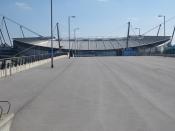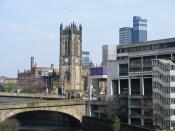In the book titled, "A World Lit Only By Fire", William Manchester describes the shadowy, bleak, and disturbing time of the Middle Ages. It was filled with illiteracy, carnage, and corruption. Then he elaborately shows the transition between the Medieval era and to the revival of learning, the Renaissance. As the story progresses, he uses quotes from historians and historic figures. He may come off as biased by just highlighting the disaster of the Medieval ages, but he is just emphasizing what makes it memorable. Because he blends his standpoint with his selected quotes, William Manchester, author of A World Lit Only By Fire. The Medieval Mind and the Renaissance: Portrait of an Age,is both informative and opinionated.
For example, William Manchester vividly describes the terror and inhumane actions of that time. It was filled with violence, fraud, and corruption. "Strangers and travelers were waylaid and killed to be eaten and there are tales of gallows being torn down-as many as twenty bodies would hang from a single scaffold-by men frantic to eat the warm flesh raw"(54).
Manchester describes how dire starvation really was for peasants. Rulers were too busy overpowering each other that the cries of suffering cannot be heard. While popes, monks, and priests collected indulgences to satisfy their pockets,men eat each other's flesh. Violence rose, especially when the culprits were easily forgiven by surrendering money. Manchester writes,"'As an incentive donors would receive, not only 'complete absolution and remission of all sins,' but also 'preferential treatment for their future sins'"(133). People were not disciplined to not resort to violence.
That giving currency was the main punishment of it. Donors were assured their forgiveness in the future, no matter what their sin may be, sin such as killing. They were,in fact, forgiven by the pope.


